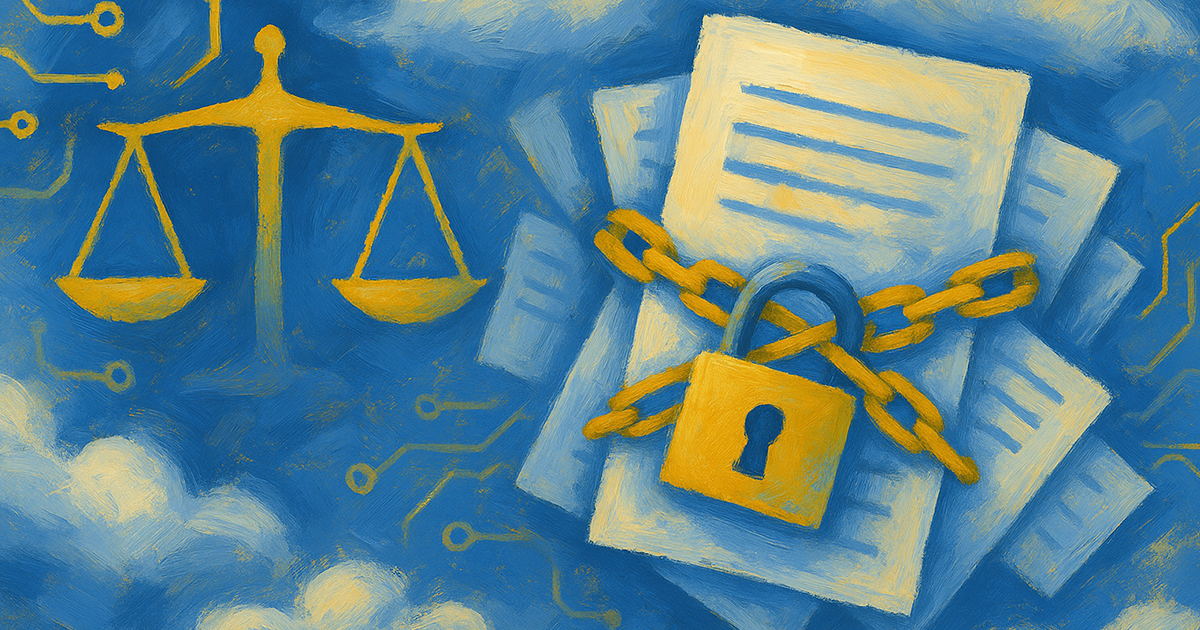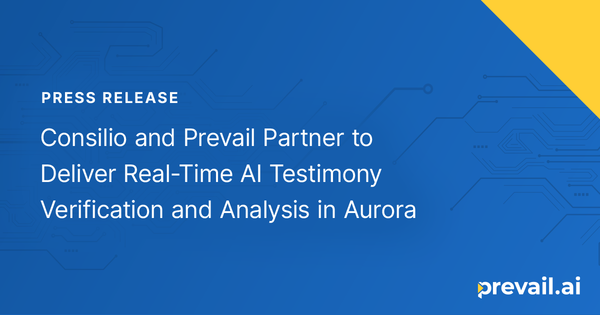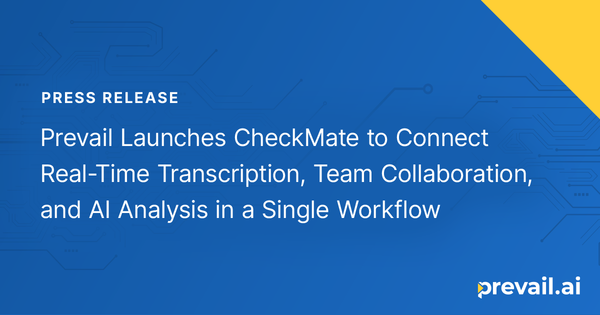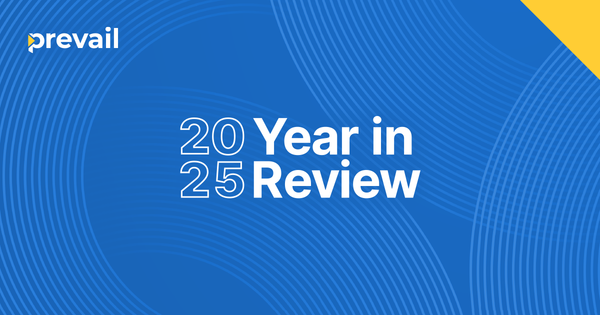How Prevail Keeps Client Data Safe in the Age of AI
Prevail protects client data with smart encryption, strict access controls, and AI-specific safeguards because legal data security demands more than compliance. It requires accountability, transparency, and trust—much more than security “theater.”

When Prevail says your data is encrypted, what do we actually mean? Most legal tech vendors will toss that word around like confetti, hoping you’ll nod and move on. Encryption, SOC 2 Type 2 compliance, firewalls, and “Zero Trust Architecture” are table stakes. Everyone claims to have them. But if everyone says their data is protected, how are breaches still happening?
Here’s the uncomfortable truth: a lot of “security” in legal tech is performative. Security theater. Flashy checkboxes, hollow promises, or worse, processes designed for convenience, not protection. Real security—the kind that can stand up to both hackers and Fortune 100 due diligence—takes more than a compliance certificate and a privacy policy buried in the footer of a website.
One "tell" for security theater is complete rigidity, which leads to incomplete security. Require numbers and special characters in passwords, and your users will duly include them, but in easy-to-guess patterns that password cracking tools already anticipate. Real security involves tradeoffs and is situation-specific.
At Prevail, we’ve prioritized data security from day one. Not as an afterthought, and not as a marketing ploy. From who touches your data, to how we vet AI systems, to where files live (and where they don’t), every decision is shaped by how we’d want our sensitive information handled if the roles were reversed. Because real protection is about more than tech specs. It’s about humans, protocols, and processes all working together as part of a system designed to withstand pressure.
Who Touches Your Data?
Most vendors will briefly walk you through their encryption specifications and server security. Fewer will clearly explain who, specifically, is handling your data behind the scenes. And even fewer are willing to take full accountability for those people.
Here’s the part many providers won’t say out loud: the longer the subcontractor chain, the harder it is to maintain control. A contractor hires another contractor, and suddenly your sensitive deposition content is passing through hands you’ve never heard of.
Prevail keeps that chain short. Every person with access to your data is an employee or direct contractor, trained in secure data handling, under contract, and subject to internal audits. And you have the option to exclude offshore staff from your data. This keeps things clean, compliant, and under direct control.
Some vendors stretch their supply chain to save money or shift blame, but the result is the same: a disaster waiting to happen. When there’s a breach or a leak, it becomes a maze of finger-pointing.
At Prevail, we built a system where there’s no one to pass the blame to—because we’re the ones doing the work. We know who has access to your data. We work with them directly.
Your Data Never Leaves the Prevail Platform
Some legal tech vendors still allow unencrypted files to bounce between inboxes, shared drives, and third-party tools, creating a nebulous patchwork of places where your data can be lost, copied, or quietly leaked. That’s a liability.
At Prevail, all customer data is encrypted during transmission and storage. When it’s decrypted on our platform, every access point is logged. From your computer to our database, your data is contained. We’ve built a closed-loop system where we control the middle—and we keep that middle small.
We make it both unnecessary and extremely difficult for anyone to remove data from the system improperly. You can still securely export all of your data if you need to, of course.
AI, Without the Black Box
AI is a real, valuable technology—and it’s also in a hype cycle. Every day, it seems, a company labels its products as “AI-powered,” but very few can explain how those systems work, what risks come with using them, or what the "AI" is actually doing.
Prevail isn't built around generative AI. Prevail launched in 2019, before the genAI boom and years before ChatGPT entered the scene. We are a legal services company first, employing AI where it can be most helpful: technology that helps accelerate human-mediated legal workflows, not replace humans.
When we do use large language models (LLMs), we employ them conservatively and with clear safeguards in place. We don’t put all our eggs in one provider’s basket. Different tools serve different purposes, and we vet each one individually. We also put contractual protections in place to prevent any provider from keeping our clients’ data or using it to train their models. Full stop.
We maintain clear boundaries between what comes from AI, what’s human-edited, and what’s original. When AI is used to transform content (like transcribing live testimony) and not invent it, it's just another step in the process that can be verified and checked like any other.
For Prevail, AI isn’t about automation for automation’s sake. It’s about freeing people up to do the parts of the job that require judgment, care, and context.
Continuous Security Testing
You can’t claim a system is secure if you never test it. And yet, many vendors still treat security as a one-time checklist rather than an ongoing process.
Prevail builds with active defense in mind. All of our software is developed by full-time employees—not contractors—and our system administration happens entirely in the U.S. We pair internal quality assurance with third-party audits, including SOC 2 Type 2 and ISO 27001:2022 standards.
We also run a bug bounty program and penetration testing through HackerOne, inviting independent researchers to find vulnerabilities before bad actors do. When someone reports a valid issue, we pay a reward, fix it, and have them verify the fix independently.
Internal teams or occasional audits aren't enough to catch problems. We add proactive testing, third-party scrutiny, and real-world incentives to harden our systems before issues ever reach your doorstep.
Beyond Security Theater
You know security theater when you see it. It’s TSA tossing your toothpaste while missing 95% of weapons. Password rules so strict that you have to use a sticky note to log in. It looks serious, but it's a gate with no fence. People just go around.
Prevail invests in actual security. If your counterparty wants to email your testimony to an AOL account, you can't stop them, but we can give them easier and more secure alternatives, like transcript-synchronized video clips on our platform, so they don't need to take data off platform.
We support both individual MFA and enterprise-grade SAML-based SSO integration—the good stuff—for free. Not "included with your purchase free,” but completely free to all counter-parties who create unpaid accounts on Prevail. You can require your own staff to use secure logins—we certainly do—and we make it worth your counterparties' while to do so as well.
As for passwords? We favor smart defaults—realistic policies that follow modern best practices. Even NIST has recanted the special-character gospel. Memorable plain language phrases beat short, forgettable number puzzles every time. Think "correct horse battery staple,” not "S00pRs&cr1t."
We adapt our security as fast as threats evolve, and we know which measures are theater and which ones actually keep your data safe.
Built with Accountability
Prevail didn’t retrofit security and AI onto an existing product—we built with it from the start. That means fewer assumptions, fewer weak links, and fewer opportunities for exposure. Whether you’re a law firm handling high-stakes litigation or a CISO managing risk, your data is handled with the utmost care—because we care.
Have questions about our security practices? Need a secure legal transcription solution? Let’s talk.





